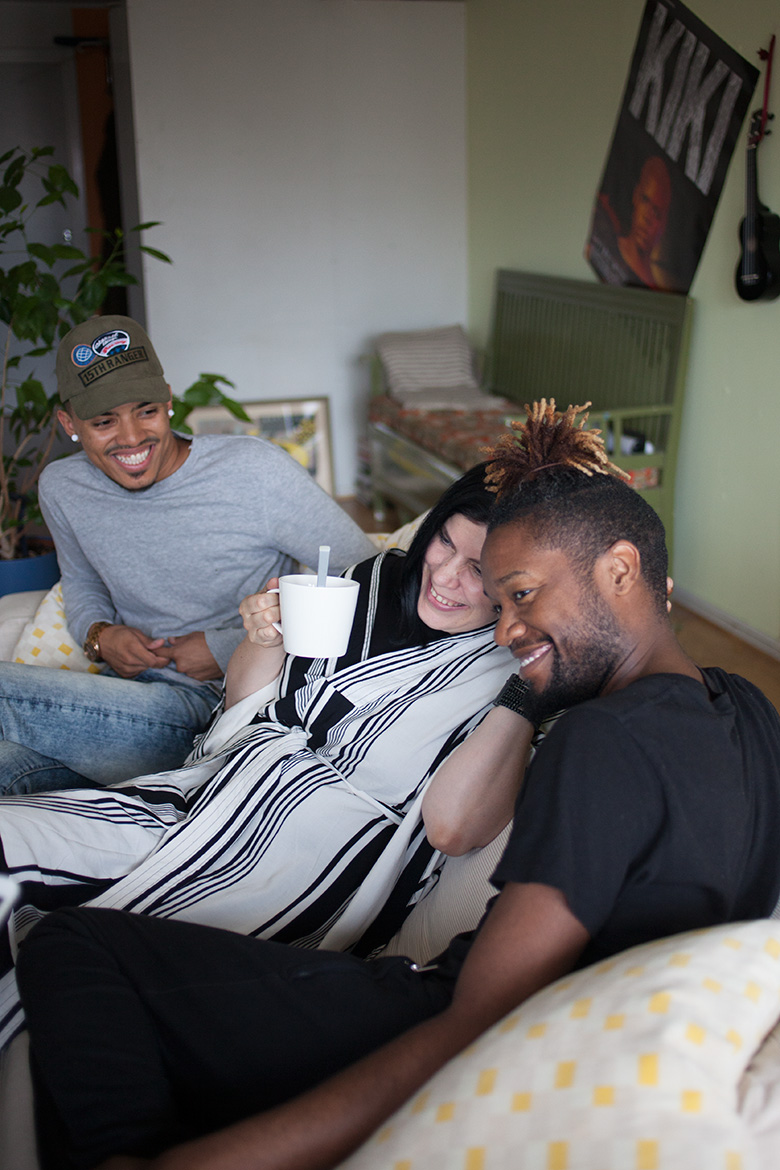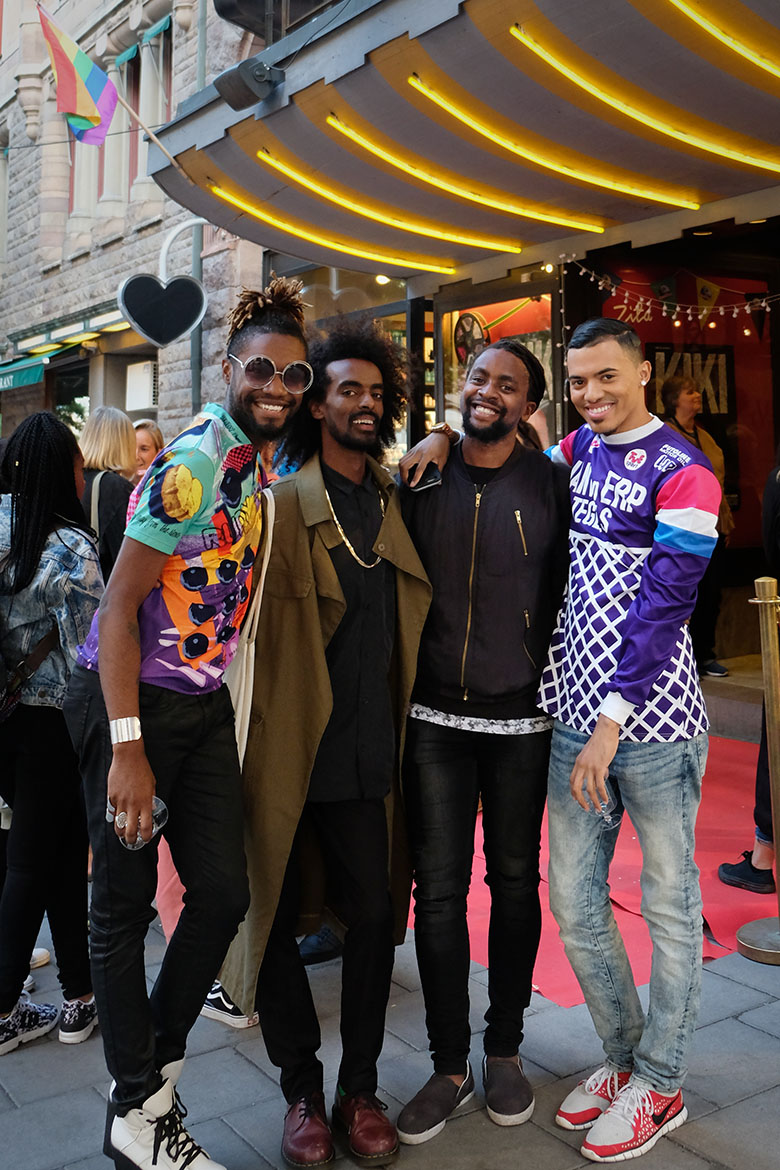text SAMUEL GIRMA with LUWAM ZERU
photos ANDREA DAVIS KRONLUND
KIKI is playing in Folkets Bio all over Sweden.
Krull met up with Twiggy, Sara and Chris for a short and sweet interview in an apartment on Södermalm, Stockholm. It was a rainy day and we sat in the living room and chatted about life. It was an honor to sit with the genius and amazing team, because they really are a team. The interview about the fabulous film Kiki became a cozy life-talk kind of conversation that day. Just as it should be on a rainy day.

Chris Waldorf, Sara Jordenö and Twiggy Pucci Garçon talking about KIKI, the documentary, in Stockholm
So, Twiggy and Sara, how did you two first meet?
Twiggy: Over four and half years ago, Chi Chi (Unbothered Mizrahi, legendary) and I worked in a community based organization called Faces New York that works with HIV prevention and educational work. It’s one of the oldest minority run AIDS organizations in Harlem. We were both community health specialists at the time, and we had been having conversations about what it would look like to work on some sort of a video project, web series or reality show of people from the ballroom scene. But then we thought people in ballroom should do it, and then January of 2012 Sara was working on a totally different project and was renting a room at our office and our boss realized that she was a filmmaker and visual artist. And my boss was like, you should say something to her, if there’s anything you could do together. So we did, we set up a meeting with Sara and pretty much immersed her into what ballroom is and who we are, and that’s how it all began.
Sara, this question is for you… What made you do this documentary and did you ever think it would be as relevant as it is worldwide? Because you did a documentary about LGBTQ people of color in NYC.
Sara: I knew very quickly that it was such an important community. I was so impressed not just by the art form, but by the leadership and so many other aspects, the alternative families and structure. And I felt it was relevant in a big way. I knew it needed to be a big film, but then how do you do that, it’s a hard task. It’s really hard. I work as a visual artist and was approached to do things in museums. This is big and it needs to be big. We stalked ‘Story’ and all our friends that knew them and we both liked the Black Power Mixtape and I explained that there might be more freedom in Sweden to do something more political. A beautiful moment was when I pitched it to the Swedish Film Institute and we met Cecilia Ledin and she saw some clips as we had already started filming it and she believed in it right away, and so did Story.
So, I’m both surprised that it’s been so well received and people seem to get so much out of it, and the 15 countries it’s been showing in. And in another way, I’m not surprised at all, ‘cause they are amazing! But I was terrified to start his project!
Where did the name KIKI come from?
Twiggy: It’s a word in the scene, it’s been around for a long time and it just means to have fun. So it wasn’t a KIKI scene at first right. Like youth and young adults would go to GMHC and have a good time, to like have a kiki and mock the mainstream scene and those were called kiki functions. Then those kiki functions got more serious or more organized and the young people started to rate kiki houses and then the kiki houses started to have kiki balls and that became the KIKI scene. So our working title for the movie was at first ‘Gesture’ and I was so against us changing the name and Sara you should talk about the change because you convinced me.
Sara: Well, I think it stands out and it also names the scene. Which means, if people go looking for this, they don’t just find the film, they find the kiki culture which is being written about. I feel that the KIKI scene is challenging the mainstream. So there is some competition there. So kiki means to have fun, but the film is very serious or I felt it had that double meaning.
Twiggy: and when Sara explained this, I was like ‘yup, girl you right’.
Could you describe the KIKI scene for us?
Chris: Well to me the Kiki scene is a safe space for people who are marginalized like us, who are not accepted in their homes or families for being themselves. So the KIKI scene is where someone goes to be themselves, be loved for who they are, meet friends. It’s comforting to me that you meet people that can relate to you and speak on some of the thing you go through and uplift each other. The biggest thing for me is the family aspect. I met Twiggy when I was 16 years old and I came out to my mom but didn’t say anything to my dad and Twiggy understood what I was going through and gave me advice that my parents couldn’t. But then there is the fun part, the dancing and the competing and that to me is KIKI.
How and when did you join the KIKI scene?
Twiggy: So the KIKI scene is a youth led movement and is an evolution of the mainstream ballroom scene. So I’ve been in the mainstream ballroom scene for 12 years, I moved to NYC nine years ago and maybe a year after I got involved in the KIKI scene, I mean I immediately started going to the KIKI ballrooms but I wasn’t active or competing until a year later, in like 2008ish. And then I created my own house in 2009.
Fabulous! Which leads me right to my next question… How is your friendship with Chi Chi in terms of you having different houses and competing against each other but at the same time as we see in the film, you are best friends?
Twiggy: Yeah, so, Chi Chi and I met in 2007, the year I moved to NYC, in her house ball. One of my closest friends from DC, Iman, knew I was moving to NYC and introduced me and was like ‘this is my sister Chi Chi. I think this is someone you should get to know’. So me and Chi Chi just immediately hit it off and we’ve been friends ever since, constantly growing closer. Like Chris said with family, it doesn’t matter what house you are in, it matters when you are competing of course, but outside of that the competition is not that important, what’s important is the bonds you form with the people and who they become to you and what they become to you, so Chi Chi is one of my best friends.
So now you’ve been travelling across Europe and other places, what would you say is the main difference between LGBTQ communities in NYC and for example Sweden or Germany?
Chris: Me, Sara and Gia (Love) went to Israel and it was interesting. Every time we went somewhere and explored, just walking around, we felt out of place. We went to a few parties and even though we were all LGBTQ, we still felt out of place. And then you have Chelsea in NYC, which is more the white male gays and Israel was like Chelsea. We were there during Pride and were wondering where people like us were. We were also in Berlin, where they have a KIKI scene and that was cool. They were doing showcases and stuff.
Twiggy: A place that comes to my mind is Sheffield in UK. Our film was in the Doc/Fest and Sheffield doesn’t seem to have any queer or LGBTQ people, or if they do it wasn’t so apparent. There were not any queer clubs, and in fact at the after-party, after the screening, the people who performed were the people from the London ballroom scene. And then you have Mexico on the other hand, which was completely the opposite. They have an established KIKI scene too, that has been around for a couple of years, though small. They had a mini ball and that was totally different from Sheffield. And even Mexico City, they might not have marriage but they have partnerships and it’s open and that wasn’t the case in Sheffield and that was the visible differences.
I’m going to ask one last question… I kind of view the KIKI scene, especially the family aspect of it as a house of empowerment and activism. Would you agree with that? Especially dealing with LGBTQ-phobia and racism. It is now like you guys are going around saying ‘I am an activist’, but what you do is bringing change.
Chris: Me personally, I look up to Twiggy. I have people around me like him, Gia and Chi Chi, and they all worked in that scene. They were more used to speaking in front of a lot of people. When we first started travelling I was always the quiet one. It’s not me being a role model but just me being myself in front of people. I had people come up to me crying or like saying that they can relate to certain things I said. I was coming to terms with my sexuality and there was no one to watch or relate to growing up. I didn’t have any role models. I didn’t know any gay people in my family, maybe like one cousin, and my parents were not really supportive in the beginning as far as my mannerisms. So if I can help someone who is like me when I was growing up, that would mean a lot. I wish I had that. After travelling and doing things, I felt like it has helped me speak up more in other areas, not just LGBTQ issues. When I was marching for Black Lives Matter, I was marching for my little nephew who is half black and half Puerto Rican for instance.
there are activists, there are advocates and then there are allies… everybody has a role to play.
Twiggy: So there are activists, there are advocates and then there are allies, and I think everybody has a role to play. And that’s the solution. There’s patriarchy, racism, and all the phobias, and no matter at what level you consider yourself, you think there is a hierarchy to it, whether you are an ally, advocate or activist or if you don’t feel like you are any of those things, you have a role to play in the solution to all of these layers of oppression and I think that when people realize that, whether they identify as one of those things, they will be active!

Twiggy Pucci Garç0n, Samuel Girma, Paulo Saka and Chris Waldorf at the KIKI premiere at Zita, Folkets Bio, Stockholm








